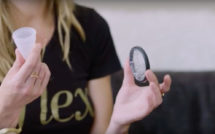
I expected losing my virginity to hurt, but I did not expect being penetrated to feel like having a knife enter me and rip me in half. It took long enough for the boy to actually be able to insert his penis into my vagina, which seemed to just not want to let anyone in, although I was more than ready and willing to have sex. Once his penis finally entered me, I clenched my teeth to avoid screaming with pain.
In “The Little Mermaid,” Ariel is cursed to constantly feel as if she is walking on sharp knives every time she walks on her new legs. Like Ariel, I had finally gotten something I wanted—losing my virginity—but the pain it caused was excruciating. I felt as though my body was essentially an object for his pleasure, that my body might as well have been his hand that he used to masturbate with. I didn’t say anything, as I assumed it was normal to be in pain the first time you had sex.
I tried again and again with as many boys as I could find. “This time it won’t hurt,” I thought to myself each time. “I’ll find the right person who makes it feel good. My vagina just needs to stretch.” But every time, either my vaginal opening simply wouldn’t widen enough to fit a penis inside, or, if it did, being penetrated made me feel as if I was literally being torn open and we’d have to stop quickly. I am queer, and sex acts with other women that involved penetration, even fingering, caused me great pain as well. I became terrified: what was wrong with me?
I became terrified: what was wrong with me?
It turns out that myself and a silent sisterhood have vaginismus, a condition that can make sexual intercourse, gynecological exams and even tampon insertion painful, if not impossible. Essentially, when anything, whether it be a penis or a finger, or sometimes even a mouth, gets near my vagina, my vaginal and pelvic floor muscles spasm and shut my vaginal opening so that I am literally impenetrable. Worldwide occurrence of vaginismus in women is estimated at anywhere from 1% to 17%, but there aren’t really any reliable statistics about its prevalence because so few women talk about it, and because it gets little to no attention from either the medical world or from the media.
I’ve always enjoyed foreplay and am a deeply sensual person, but intercourse itself feels like, in the words of French feminist philosopher Luce Irigaray’s seminal, must-read essay “This Sex Which is Not One,” “a violent break-in: the brutal separation of the two lips by a violating penis.”
I puzzled—I still puzzle—over why I’ve been cursed with this condition. Even though I am far more attracted to women than to men, this is not why. Every man I’ve had intercourse with (or tried to) was someone I actively chose and desired. Many women with vaginismus have a history of sexual trauma or assault; on the other hand, I have never experienced any form of sexual trauma and abuse, and was so lust-ridden and eager to have sex growing up that my friends used to call me “Samantha,” after Samantha from Sex and The City. You’d think my being predominantly same-sex attracted would be a blessing, since sex between two (cisgender) women doesn’t involve the insertion of a penis into a vagina. But oral sex with women doesn’t provide me much pleasure, and instead mostly discomfort, because my pelvic floor muscles are such a mess. I usually pick the role of the top and give other girls orgasms to hide the fact that I myself can’t have one, and probably never will.
I puzzled—I still puzzle—over why I’ve been cursed with this condition.
After the great love of my life (so far), who I desired more than anyone could desire anything, was not able to give me an orgasm despite countless attempts, I gave up hope. If she couldn’t make it happen, who could?
In college, I auditioned for and got into our school’s production of “The Vagina Monologues.” I had never read or seen the play, but wanted to join it to be part of a feminist community. But when we did the first read-through, I felt humiliated and enraged. The play busts the taboo of talking about vaginas, which is highly commendable, but also implies that feeling sexual pleasure is the key to happiness, true womanhood, and self-actualization.
One monologue in particular, in which the narrator says that she could only learn to love and know herself after orgasaming for the first time, made me squirm. Am I less of a woman, less of a person, because I can’t experience sexual pleasure? Aren’t my heart and my brain, not my vagina, the key to who I am as a person? The play insists that a woman’s vagina is her lifesource and essence of selfhood (this message is also dangerously exclusive of trans women), but I am not my broken vagina; I am my big heart and my sharp mind.
Am I less of a woman, less of a person, because I can’t experience sexual pleasure?
I wish I could write a happy ending, but I can’t. Despite seeking every type of treatment, from extensive physical therapy to having botox injected into my pelvic floor muscles to make the spasms stop, my condition persists. I am not asexual and do want to share sexual intimacy with someone. I got lucky when I met my ex, a man who had Erectile Dysfunction. We were a perfect match because both our bodies were broken in compatible ways, and the amazing things he did to my body with his mouth brought me as close to orgasming as I ever have. But still, I never came.
When we broke up, I felt hopeless that I would be alone forever because I could never find someone as understanding about my condition as he was, and because no one wants to be with someone who “can’t have sex.” I still feel hopeless about this, and think that I’ll probably be alone forever because of it. Pretty much every one-night stand I’ve had has ghosted after realizing my condition, so how can I get someone to date and love me long-term?
If I’ve learned anything from having vaginismus, it is that the way society constructs “sex” is exactly that—a construction built around the primacy of penetration and male pleasure. Most people use the words sex, intercourse, and penetration interchangeably, but they’re not interchangeable. Penetration is one sex act; there is far more to sex, and to eroticism, than penetration.
The way society constructs “sex” is exactly that—a construction built around the primacy of penetration and male pleasure.
Why not rethink our cultural concepts of “sex” and “the erotic” so that genital pleasure isn’t seen as the main key to happiness? Audre Lorde’s seminal essay “Uses of The Erotic” conceptualizes “the erotic” as “an assertion of the lifeforce of women; of that creative energy empowered, the knowledge and use of which we are now reclaiming in our language, our history, our dancing, our loving, our work, our lives.” Far more than sexual activity, the erotic is, Lorde writes, “the power which comes from sharing deeply any pursuit with another person. The sharing of joy, whether physical, emotional, psychic, or intellectual, forms a bridge between the sharers which can be the basis for understanding much of what is not shared between them, and lessens the threat of their difference…whether it is dancing, building a bookcase, writing a poem, examining an idea.”
This concept resonates deeply with me; some of the most erotic and sensual moments in my life have had nothing to do with sex, but have involved especially stimulating conversations about movies and music, the experiences of sharing something special to me with someone else, or intellectual discoveries. Perhaps if we recognize that sensuality and eroticism are about more than sex acts, people like me will have an easier time living and loving, and being able to be loved.
Photo from peacefuldumpling.com.



